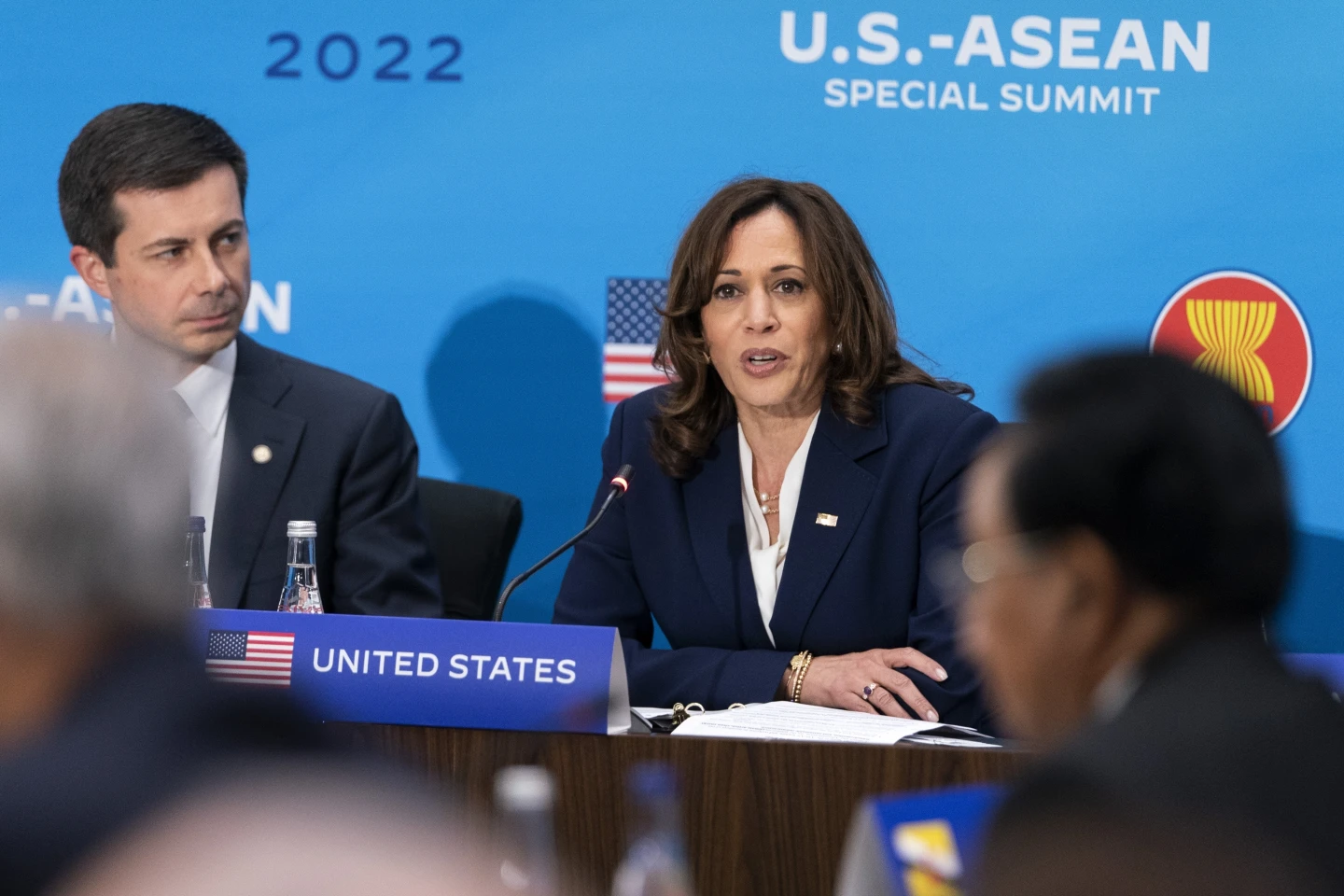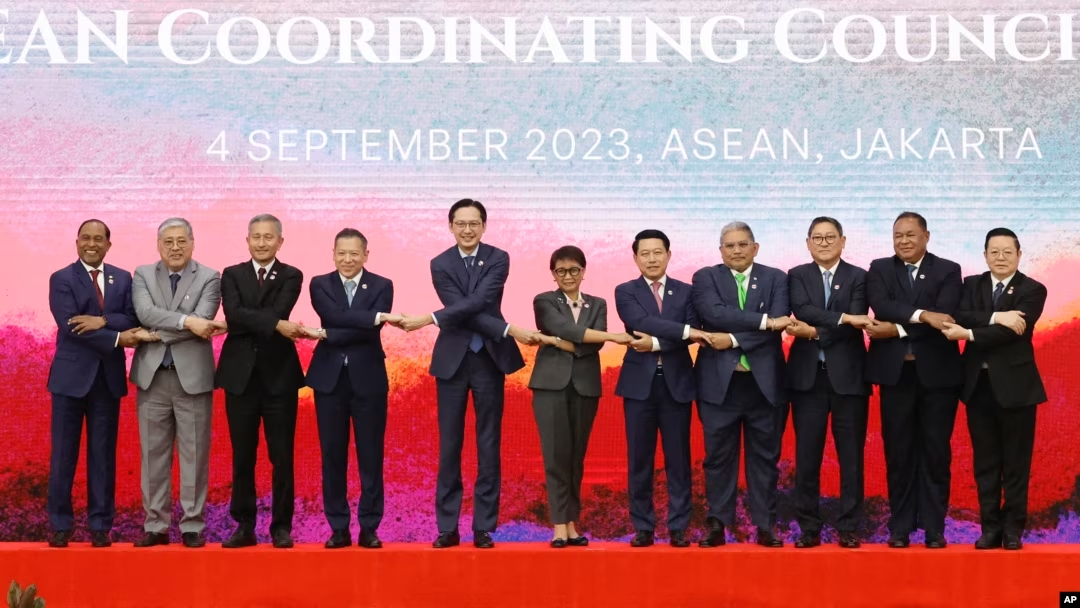Challenges Await Vice President Harris At ASEAN Summit Amid Biden's Absence
Southeast Asian leaders gather for the year's final summit, facing a host of pressing issues with no immediate solutions in sight. Challenges await Vice President Harris at ASEAN summit amid Biden's absence.
Author:Dexter CookeReviewer:Hajra ShannonSep 04, 2023172 Shares172.2K Views

Southeast Asian leaders gather for the year's final summit, facing a host of pressing issues with no immediate solutions in sight. Challenges await Vice President Harris at ASEAN summit amid Biden's absence.
The Association of Southeast Asian Nations (ASEAN) meetings in Jakarta open against a backdrop of Myanmar's ongoing civil conflict, renewed tensions in the South China Sea, and the enduring rivalry between the United States and China.
The Absence Of U.S. President Joe Biden
Traditionally, U.S. President Joe Biden attends these summits, but his absence this year adds to the somber atmosphere.
The absence is notable given the usual show of unity among ASEAN member states and their counterparts.
“„It’s hard to look at what we’ve done as an administration, since the very beginning, and come away with a conclusion that we are somehow not interested in the Indo-Pacific or that we are deprioritizing the Southeast Asia nations and those relationships.- John Kirby, a national security spokesperson
After discussions among ASEAN heads of state, the meetings will expand to include Asian and Western counterparts, providing a forum for discussions on various global issues, including free trade, climate change, and global security.
These meetings have also become a battleground for the rivalries between the United States and China and their respective allies.
Chinese Premier Li Qiang's Participation
Chinese Premier Li Qiang will attend these meetings, including the East Asia Summit, where he will meet with U.S. Vice President Kamala Harris and Russian Foreign Minister Sergey Lavrov.
The presence of high-level representatives from major powers underscores the global significance of these meetings.
While President Biden is not attending the ASEAN meetings, he is planning a trip to Asia, including the G-20 summit in India and a visit to Vietnam to strengthen ties in the region.
The Biden administration emphasizes that this is not a sign of deprioritizing Southeast Asia but rather a part of their broader strategy to engage with the Indo-Pacific region.
Marty Natalegawa, a renowned former Indonesian foreign minister, expressed sadness at Biden's absence but said such warning lights were more disturbingly indicative of ASEAN's waning influence.
“„The absence of the U.S. president, while it is disappointing and symbolically significant, is for me the least of the worry because what’s more worrisome actually is the more fundamental structural tendency for ASEAN to become less and less prominent.- Marty Natalegawa, Former foreign minister of Indonesia
ASEAN's Challenges And Declining Relevance
Some experts express disappointment over Biden's non-appearance but argue that it reflects ASEAN's declining relevance in addressing critical regional issues.
ASEAN's principle of non-interference and consensus-based decision-making has made it challenging to take unified action on critical matters.
Myanmar's civil conflict, ongoing since the military coup two years ago, remains a significant concern. ASEAN's inability to address the situation effectively has raised questions about its effectiveness in resolving crises.
Territorial disputes in the South China Sea also persist, with internal disagreements within ASEAN over their approach to global competition between the United States and China. Some member states seek closer ties with the U.S., while others align with China.
The European Union has warned that its relations with ASEAN could be affected by Myanmar's leadership role in the organization. Myanmar's military-led government has not been recognized by ASEAN but remains a member.
Myanmar may not chair the regional bloc in 2026 as scheduled, and ASEAN leaders will decide whether the Philippines should replace Myanmar as host for that year.
ASEAN's Need For Reform
To address such crises effectively, ASEAN member states have discussed proposed rules that would allow the group to make decisions even without consensus, a crucial reform to respond more swiftly to crises.
Vice President Kamala Harris's visit to Southeast Asia aims to reaffirm the U.S.'s commitment to the region, despite President Biden's absence.
Harris has become a key interlocutor for the administration as it seeks to strengthen partnerships in the Indo-Pacific to counterbalance Chinese influence.
These ASEAN meetings are crucial for addressing regional and global challenges, and Harris's presence underscores the United States' commitment to Southeast Asia.
While the meetings may not yield immediate solutions, they provide an essential forum for dialogue and cooperation in a region of growing geopolitical importance.
Final Words
In conclusion, Southeast Asian leaders are grappling with a multitude of pressing issues during their annual summit, with no quick resolutions in sight. The absence of U.S.
President Joe Biden adds to the complexity of the situation, highlighting the challenges faced by the Association of Southeast Asian Nations (ASEAN) in maintaining its relevance in addressing regional crises.
Myanmar's ongoing civil conflict and disputes in the South China Sea continue to dominate the agenda, showcasing ASEAN's limitations in taking unified action. The European Union's concerns over Myanmar's leadership role in ASEAN further complicate the situation.
Vice President Kamala Harris's presence reaffirms the United States' commitment to the region and its efforts to counterbalance Chinese influence. These meetings, though challenging, remain a crucial forum for dialogue and cooperation in an increasingly geopolitically significant part of the world.

Dexter Cooke
Author
Dexter Cooke is an economist, marketing strategist, and orthopedic surgeon with over 20 years of experience crafting compelling narratives that resonate worldwide.
He holds a Journalism degree from Columbia University, an Economics background from Yale University, and a medical degree with a postdoctoral fellowship in orthopedic medicine from the Medical University of South Carolina.
Dexter’s insights into media, economics, and marketing shine through his prolific contributions to respected publications and advisory roles for influential organizations.
As an orthopedic surgeon specializing in minimally invasive knee replacement surgery and laparoscopic procedures, Dexter prioritizes patient care above all.
Outside his professional pursuits, Dexter enjoys collecting vintage watches, studying ancient civilizations, learning about astronomy, and participating in charity runs.

Hajra Shannon
Reviewer
Hajra Shannona is a highly experienced journalist with over 9 years of expertise in news writing, investigative reporting, and political analysis.
She holds a Bachelor's degree in Journalism from Columbia University and has contributed to reputable publications focusing on global affairs, human rights, and environmental sustainability.
Hajra's authoritative voice and trustworthy reporting reflect her commitment to delivering insightful news content.
Beyond journalism, she enjoys exploring new cultures through travel and pursuing outdoor photography
Latest Articles
Popular Articles
